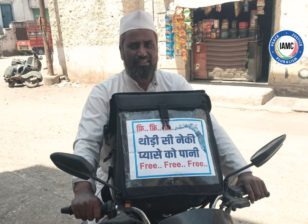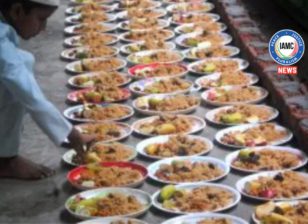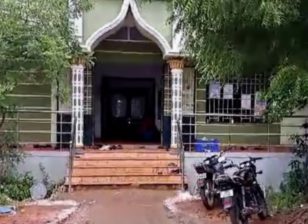In India, Muslims Are Performing Last Rites For Hindus Who Died Of COVID-19
NEW DELHI— In the midst of a deadly second coronavirus wave and medical care shortage, Moin Mastan and his team of 25 volunteers have been working round the clock to perform the last rites, cremations and burials of 40 to 50 Indians every day who have died with COVID-19 infections in the central Indian state of Maharashtra—all while fasting daily for Ramadan, a holy month in Islam for tightened devotion in spiritual reflection, worship and prayer.
“We said special prayers before embarking on this sacred mission of performing last rites of people dying of COVID,” Mastan said. “With God’s name we started our work, we will have no regrets if we die while performing last rites of COVID victims; in fact, dying in the line of duty will be an honor for us.”
India is logging more than 300,000 positive cases and more than 2,500 deaths daily, but experts say the real infection rate must be several times higher. According to government reports, nearly 200,000 people had died due to COVID in India as of April 27, 2021; 63,928 of them from Maharashtra. Mastan and his team have laid to rest more than 3,500 bodies since January.
The heartbreaking scenes of COVID patients dying in hospitals and overflowing crematoriums have shocked the country. This week, hospitals started posting distress messages about oxygen shortages. Family members of COVID patients are posting on social media and Whatsapp chats on behalf of their loved ones, seeking oxygen or hospital beds that simply aren’t available, even in the cities.
Experts predict India’s infection rate will peak in mid-May when daily COVID cases could spiral over 400,000 with a substantial spike in the death rate.
So far, none of the volunteers have caught the virus.
Critics of Prime Minister Narendra Modi and his Hindu-first Bharatiya Janata Party (BJP) have been quick to point out the government’s different treatment of Hindus and Muslims during the pandemic. Millions of Hindu pilgrims continue to flock to the festival called Kumbh Mela without criticism from the government while Indian authorities cracked down on a gathering of about 3,000 Muslims a year ago, before India entered its first lockdown and while reports of COVID-19 infections in India were just beginning. Indian authorities charged the head of the Muslim missionary organization with “culpable homicide” for hosting a gathering and detained dozens of the foreign tourists who came with valid travel documents, charging them with various crimes like disobeying an epidemic act from 1897. Some Indian media referred to the incident as “corona jihad”, sparking backlash against Muslims accused of spreading the disease.
It was perhaps the Modi administration’s sense of victory over COVID-19 that prompted them to allow the Kumbh Mela in April.
Last year when the first COVID-19 wave hit the country Prime Minister Modi announced a sudden nationwide lockdown that brought unprecedented hardships to nomadic populations and migrant laborers working in big cities like Delhi and Mumbai. They were forced to walk hundreds of miles to their native villages.
But then complacency set in. There was a pause in the surge in COVID cases just before the second wave hit the country.
In a speech at the World Economic Forum’s Davos dialogue in January, Modi said India was among the few countries that successfully controlled COVID-19. “India took a proactive public participation approach and developed a COVID-specific health infrastructure and trained its resources to fight COVID,” Modi said.
The Kumbh Mela is the largest congregation of Hindus in the world that’s held every 12 years. The festival was scheduled for 2022 but the government advanced it by a year, reportedly for some astrological reasons, without any consideration for the surging pandemic. During the Kumbh Mela, millions of devotees assemble on the banks of the river Ganga in the Himalayan state of Uttrakhand to take a dip in the water. The shocking images of crowds not following social distancing protocols at the Kumbh Mela shocked many who felt the congregation would spread COVID cases throughout the country.
Uttarakhand Chief Minister Tirath Singh Rawat, who belongs to the BJP, told the media that there is no comparison between the Muslim gathering in Delhi and the Kumbh Mela as the former was held in a closed space while the latter is being held in a vast open area. Most importantly, he said, the Kumbh is at the bank of the River Ganga, a very holy place for many Hindus. Maa (Mother) Ganga’s blessings are there in the flow. So, there should be no corona, he said.
Now an unprecedented surge in COVID cases has caused panic. Modi recently tried to appeal to the festival goers, saying that the Kumbh Mela “should now only be symbolic amid the coronavirus crisis,” stressing that staying home will help the fight against the pandemic.
And just at the time when massive crowds thronged to the Kumbh Mela, big election rallies were held in the Indian state of West Bengal with top BJP leaders including Modi and Home Minister Amit Shah attending even as COVID-19 cases were surging. After a month attending rallies there, where elections for legislative leaders happened in recent weeks and were in part delayed to May, Modi cut short his visit.
Unconcerned about politics and facing spiraling infections, Mastan has decided not to add more volunteers to his group. Performing last rites of COVID bodies is a specialized job that involves cleaning the bodies and moving them to the crematoriums in ambulances. It’s also a tough job to see so many dead bodies during a national emergency.
“A lot of people want to join us to perform the last rites of corona victims, but we can’t trust anybody who comes forward to do that, because we don’t want the last rites to be done in a wrongful and unprofessional way,” Mastan said. “A fortnight back, we sent four new volunteers to do cremation of a COVID victim but they couldn’t handle it.”
Mastan’s team has been collecting funds between themselves to drive private ambulances for COVID patients and transport corpses to cremation centers and graveyards. Many cremation centers have become overrun, as families seek to cremate their loved ones within 24 hours of their deaths.
“Our group is running six ambulances, our volunteers which include engineers’ doctors and businessmen pay from their own pocket to run those ambulances,” Mastan said.
They perform last rites of people belonging to all faiths: Hindus, Sikhs, Jains, Buddhists, Muslims and Christians. About 80% of Indians are Hindu and practice cremation. Usually, upper caste Hindus called Brahmins, considered a priestly class, perform last rites ceremonies, while lower caste Hindus prepare the bodies for cremation.
Normally, relatives would attend the ceremonies, but families of the COVID victims who were in contact with the patient are required to quarantine according to government regulations. Mastan and his team call the families on video calls to show them the last rite ceremonies.
Mastan said their faith in God gives them courage and strength to deliver even as body bags are piling with every passing day. The satisfaction of doing their duty in these testing times is what keeps them going.
They break their fast while performing the last rites of the corona victims at the cremation centers.
“We put our faith in God and do not worry about anything,” he said. “A couple of days back we broke the fast in the cremation ground, while we were cremating a body, the family was kind enough to bring fruits and other materials for us to the cremation ground, this is our reward, this gives us satisfaction.”
This story first appeared on spokanefavs




